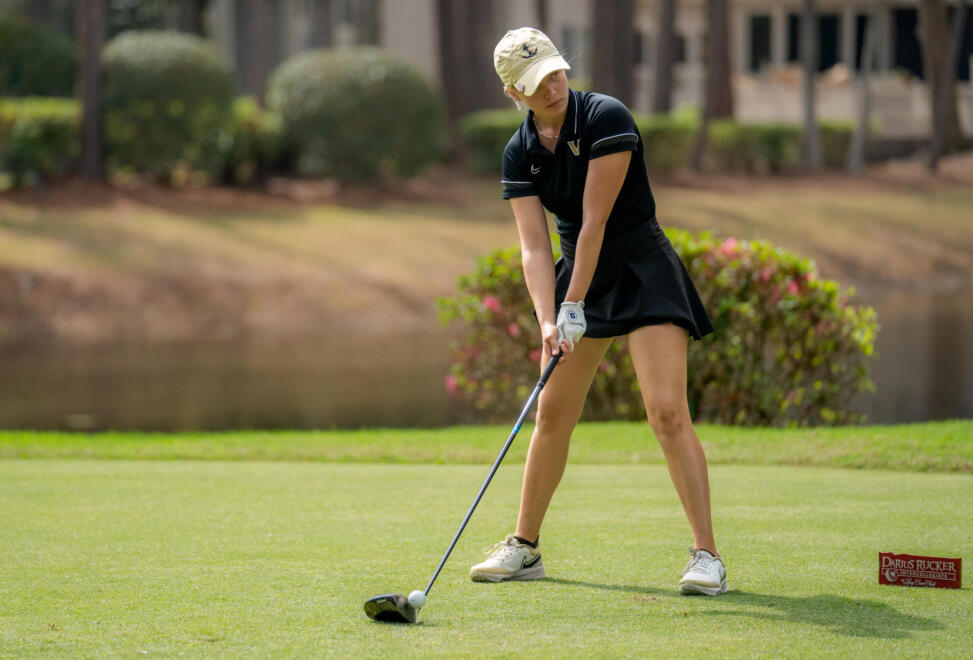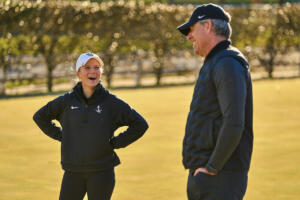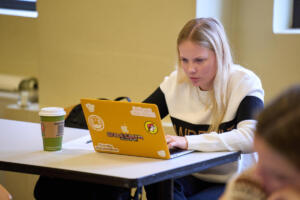Meet Celina Sattelkau, a #VU2023 graduate who balanced her passion for golf with her pursuit of a bachelor’s degree in psychology and communication of science and technology. #AnchorDown pic.twitter.com/7gmLfvG2vf
— Vanderbilt Athletics (@vucommodores) May 25, 2023
A Good Walk Savored
by Graham HaysAll-American Celina Sattelkau feels at peace on a golf course. It’s why she keeps coming back.
For Celina Sattelkau, there always has been more to golf than completing a round in fewer shots than her opponent. From the beginning, before there were trophies and spectators, being on the golf course offered tranquility. That, to her, is the game’s greatest allure.
“I like how in golf you can be with yourself, with your own mind,” Sattelkau explained. “I love the peacefulness of golf and how you can really just connect with nature. It’s just you. And there’s not really anybody else you need to focus on.”
That feeling is what brought her back when she wasn’t sure she ever wanted to swing a club again. It’s why she persisted when she wasn’t sure she could ever hold a club again. And perhaps it’s why, when golf is done, she feels called to work toward protecting and sustaining the natural world that shaped her passion in the first place.
An All-American at Vanderbilt and decorated amateur representing her native Germany in international competition, Sattelkau has amassed a resume that few peers in collegiate golf can match. The well-honed skills responsible for those credentials are useful when the senior stands over a pressure putt. But during the most difficult of rounds, the shots she’s learned to execute matter less than what she’s learned about herself on a golf course. When you’ve been where she’s been and found the faith to carry on, there is no more reason to fear failure.
And every reason to embrace an opportunity to grow.
Far from home and mentally drained after her freshman year, she wasn’t sure she wanted to continue in golf. Two years later, suffering from neuropathy and unable to hold a club after COVID-19, she wasn’t sure she could continue. Yet as Vanderbilt prepares for the upcoming SEC Championship and the NCAA Tournament beyond, the senior isn’t merely back. She’s on top—ranked among the top 20 in the nation in scoring average—and grateful for the journey.
“If I could tell my pre-college self something, it would be that you should not be afraid of failure,” Sattelkau said. “You should not be afraid to mess up. You should just go into everything with a growth mindset and ask for help if needed. Because growth requires going out of your comfort zone. It doesn’t come easily.”

"Instead of being afraid of performing poorly, I had to really focus on having fun and getting better and being close to nature—enjoying golf and doing what I love doing.”
-Celina Sattelkau
A Natural on the Course
Growing up amid the rolling low mountains of southwestern Germany, in a town on the edge of the country’s largest contiguous forest, Sattelkau loved to hike and ski. But nothing fulfilled her zest for the outdoors quite like golf.
Her parents tell her that she spent many of her earliest moments around the game trying to prevent golf balls from dropping into the hole on putting greens. When it comes to her own memories, however, some of her first and fondest revolve around going away to golf camp when she was 7 or 8 years old. She doesn’t remember the shots or scores but does vividly recall camping out next to the driving range and eating candy around a bonfire.
“I have fun playing golf because it’s so close to nature and so peaceful,” Sattelkau said. “I just love being on the course—like physically just being there.”
Although she still tees it up with her parents from time to time, and her mom and dad sometimes caddy for her, they never pushed her to pursue the sport’s competitive realms. That passion took root on its own. On a family vacation in Portugal, even as the family played for fun, a spark caught when she watched European Tour professionals compete in the Portugal Masters. For perhaps the first time, golf existed beyond the present tense. It wasn’t just something to do. It was something to aspire to—to be like those players.
Back at her home club, she noticed that she was improving more rapidly than girls who started playing around the same time. The feeling was a rush, not born of superiority but of possibility. More than the tangible reward of results in tournaments, that sense of improvement stoked the fire quietly burning.
“I was so happy about getting better,” Sattelkau recalled. “Winning wasn’t necessarily always the biggest goal. It has always been about improving, rather than winning or not winning. I’m 5-foot-3. I’ve always been on the shorter side. So especially growing up, there were always kids who were a little taller or bigger who were my age. So sometimes it was hard to win against them, but I was still able to see my own progress.”
She saw quite a bit of it as she raced through the youth golf ranks. She represented Germany in myriad international competitions and was ranked among the top 10 European players in her age group. By 2018, she became the first non-English winner of the English Girls Open Championship. But Sattelkau also knew she wanted to pursue a university degree, something that isn’t easy to balance with elite athletics in Europe, where they are separated from the university model. She had friends who turned pro in golf and tried to take online classes toward degrees, but she wanted a full academic experience.
While Germany’s Antonia Scherer was an important part of Vanderbilt’s SEC championship in 2014, women’s golf head coach Greg Allen hasn’t relied heavily on international talent over the years. But when Allen and his staff narrowly missed out on a couple of top-rated American recruits in the high class that graduated in 2019, they needed to broaden their search.
Serendipitously, that was the moment that Ted Long, a golf coach and instructor who has worked in Germany for more than 20 years, reached out about a young German who packed a lot of power in a small frame. Sattelkau’s resume impressed Allen. The person behind the resume proved even more impressive when Sattelkau and her father visited Vanderbilt.
“She’s got just a personality that’s off the charts,” Allen said. “Her smile is very contagious. She’s just a fun person to be around, got a lot of positive energy oozing from her. And we’re all about positivity. We’re all about a growth mindset.”
 Sattelkau and Coach Allen at Vanderbilt Legends Club (Harrison McClary/Vanderbilt).
Sattelkau and Coach Allen at Vanderbilt Legends Club (Harrison McClary/Vanderbilt).
Finding Peace of Mind in Golf
Sattelkau was excited to begin a new adventure when she arrived in Nashville in fall 2019. Looking back, she feels she also naively assumed a fresh start would ease the mounting pressures she brought with her—pressures that come with competing at an elite level, especially in Germany, where youth golf emphasizes team competition and she was part of a demanding German youth national team structure. She enjoyed her Vanderbilt experience from the outset, but like any freshman, there was a lot of change to process academically, athletically and socially. Not to mention that she processed it in a second language she still sought to master.
All of the pressures, old and new, began to take a toll on her performance on the golf course. From the outside, her freshman season was hardly a disaster. She earned All-SEC freshman academic honors and finished in the middle of the pack at times against older, more experienced competitors. But to her, any sense of tranquility on the course was gone.
“I wouldn’t say I felt like the world was collapsing, but it was just not as I imagined it to be,” Sattelkau said. “Life threw a lot of curveballs at me that I didn’t really see coming and that required a lot of work.”
The COVID-19 pandemic arrived that spring, leading to the abrupt end of the golf season. Initially, for all the pandemic’s uncertainty, that disruption carried a small silver lining in giving Sattelkau no choice but to step away from competition and reassess. She still saw the positives in school, her teammates and the challenges of the college experience. But she didn’t enjoy golf. Rather than the continued progress on which she typically thrived, she struggled to tread water.
By the time she returned to Germany at the end of April 2020 (her dad, who was visiting when the pandemic hit, remained in Nashville with her during the interim), she was seriously considering walking away from the sport.
“I felt like all my problems were kind of derived from golf,” Sattelkau said. “And so I think for a couple of days, giving up golf seemed to solve all my problems. Whereas when I took more time to think about it, I realized life is going to have challenges wherever I go. I don’t think golf is the problem. It’s just right there in the middle of my life, so it feels like the problem.”
After being a part of the German national team for years, she had been dropped from the roster that year as her on-course performance slipped. That proved something of a blessing in disguise when she returned home and contemplated her future. Instead of coaches always looking over her shoulder, monitoring every round, workout and meal, she was free to play when—and if—she felt like it.
That summer, never traveling any farther than the fairways and hiking trails near home, she embarked on a journey of self-discovery. She read books offering mental and spiritual advice, invested in her religious faith that had recently awakened and spoke with people whose counsel she trusted. True to form, she thrived on progress—she would write down a goal, such as spending less time on her phone, and chart how she fared each day. Rather than retooling her game with a new swing or equipment, she overhauled her mental approach.
“I had to realize I do really love golf, and I want to do it,” Sattelkau said. “I wasn’t going to let any of the struggles I encountered my freshman year hold me back. Instead of being afraid of performing poorly, I had to really focus on having fun and getting better and being close to nature—enjoying golf and doing what I love doing.”
She returned to Vanderbilt for her sophomore year reinvigorated. In the classroom, she made the Dean’s List both semesters and was a WGCA Academic All-American. On the course, she earned All-SEC and All-America honors, finishing third in the SEC stroke play event with the second-lowest three-round score in Vanderbilt history. After All-American Auston Kim opted out of the fall semester, Sattelkau seamlessly stepped into the void as the team’s No. 1 golfer.
“Next thing you know, she’s our best player that fall,” Allen said. “And then in the spring, Auston gets back in here and they start pushing each other for that one and two spot. Neither one of them likes to lose, and they’re both competitive. She kept having great finishes, and that kind of drove our team in the right direction that spring.”
While the team would have to wait a year to win its regional and advance to the NCAA Women’s Golf Championship, Sattelkau completed her breakthrough sophomore year by qualifying to play for the individual title and advancing all the way to the final round of stroke play.
At peace on and off the course entering her junior year, Sattelkau appeared poised to take her own game and perhaps Vanderbilt to unprecedented heights. Until COVID-19 again interrupted the story and, at least indirectly, tested everything she had learned about herself.
Overcoming a New Physical Challenge
Sattelkau initially recovered from the symptoms most commonly associated with COVID-19 after testing positive in fall 2021. But she soon began experiencing weakness in her hands and feet, eventually diagnosed as peripheral neuropathy. As research into the disease and related effects has continued, studies suggest there is an increased prevalence of peripheral neuropathy among those who have been diagnosed with COVID-19.
Golf aside, daily life was difficult. She struggled to type papers, instead dictating them using speech-to-text functionality. Sometimes she could barely grip a cup. Medication left her constantly tired. She lost 10 pounds that she’s still struggling to regain.
“It was shattering in the beginning,” Sattelkau said. “I mean, I couldn’t hold the club. It was crazy. I think especially in that fall semester, not really having anybody who knew what was going on, it was really hard mentally. Harder than I think I wanted to admit.”
She saw gradual progress throughout the spring, even playing golf without significant pain or discomfort for a time, only to experience a setback. By the middle of the summer, she struggled to warm up without her hands hurting. At a loss for conventional treatment, a coaching contact in Germany recommended she visit a doctor who specialized in homeopathic treatment.
“In the end, I don’t know if it was a placebo or it actually was just the nature-based treatment, but that has really been helping me,” Sattelkau said. “On a day-to-day basis, I’m pain free. I still have to gain back my weight and a lot of my strength, and I have to be careful not to get sick again, but I feel like it’s at the point where I can work with it moving forward.”
By this past August, once again ensconced with the national team, she helped Germany finish third in the World Amateur Team Championship in France. Flying from that event to Vanderbilt’s first fall competition at the famed Pebble Beach Golf Links in California, she nearly broke down in tears—not in pain this time, but in relief at how far she had come in barely a year. Despite a challenging opening round in California at the prestigious Carmel Cup, she was Vanderbilt’s top finisher by the end of the event. She tied for fourth the next time out, playing on her home course at the Vanderbilt Legends Club in the Mason Rudolph Championship.
She hasn’t looked back, putting together a season that offers little hint of past adversity.
“She plays with a lot of fire, a lot of energy, a lot of emotion,” Allen said. “I think that’s one reason she had so much success that All-American year as a sophomore. She learned to control her emotions a little bit. She still can get very emotional, but she’s learned to control it a little bit better. But the fist pump is my favorite. And there’s just no giving up in her. She’s going to fight and give you everything in her tank from start to finish.”

Sattelkau in her CSET class. (Harrison McClary/Vanderbilt)
A Path Forward
A double major in psychology and communication of science and technology, with a minor in environmental sustainability studies, Sattelkau accumulates academic honors as quickly as golf accolades. This past fall, she was accepted into the Owen Graduate School of Management, where she’ll pursue a master of science in finance and use the additional season of athletic eligibility available to all student-athletes whose collegiate careers were affected by the COVID-19 pandemic.
She has a lot of golf left to play. Those pros she once watched in Portugal and on television? She’ll be one of them soon enough. Asked where he sees Sattelkau in 20 years, Allen talks about a business career and family—but only after “maybe winning a major, having a very nice career on the LPGA tour.” But golf will eventually end, at least as a vocation, and Sattelkau is set on pursuing an interest in environmental finance. She wants to give back to the natural world that she loves so much.
“What I want to do is basically leverage financial means to create a more just world,” Sattelkau explained. “I’ve studied psychology to understand the humans. The communication of science is to learn how to communicate the environmental knowledge I gained from my minor. And my master of finance is the complementary part, where I’ll be able to assess projects and figure out how to use the financial means available to make a positive impact.”
The still-fiery displays of joy and occasional frustration may belie it, but she is at peace on the golf course these days. You will occasionally find her in a hammock, soaking up the sun in some quiet spot on campus and watching the squirrels. She also makes frequent trips to Radnor Lake State Park, which if not quite as hilly as her native region, still offers pleasant hikes. But for someone who is never happier than when she’s outdoors, there is still nothing like the golf course.
“I think I’ve had a lot of setbacks in the last couple of years, which on one hand are super unfortunate,” Sattelkau said. “But also I wouldn’t change it for anything if I could do it again. That sounds weird because there have been some things that I had to go through that were really tough. But it just taught me so much and helped me grow as a person so much that I wouldn’t want to change a thing.”
